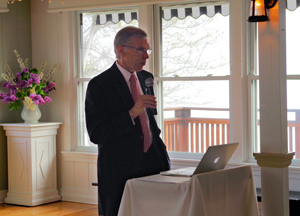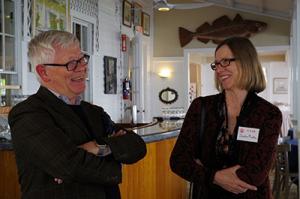Connecticut Academy of Arts and Sciences
Minutes of the CAAS 1444th Meeting
May 19, 2015
Owengo Inn, Branford, CT
Minutes of CAAS Meeting 1444: Libraries in the New Information Ecosystem.
Kendall Wiggin, Connecticut State Librarian
The president opened the final CAAS meeting of the 2014-2015 academic year by reporting on the Open House at CAAS facilitated by the president, the Kohorns, Monica Aspianto and her friend Nija. The event was a great success with approximately 170 books taken by members. There was strong desire for another open house. However, the president deferred because of a June 6th Council meeting.
President Tignor then introduced Kendall Wiggin, the 10th CT State librarian in 150 years. In his remarks, Tignor described Wiggin as a true New Englander from New Hampshire; a devoted member of CAAS; and a man who is fun to be around.
The minutes of his talk are as follows.

Libraries are very dear to my heart. I want to rally your support for them in my talk today. Doing a lot of that these days. Do we need libraries? Focus on that question. I will begin by asking, “What is the future of the Libraries.” Focus on the question of decisions of policy When we talk of libraries, we talk of archives, books and materials. They are in the same ecosystem today.Libraries were created and exist because they were needed. Libraries historically spread culture from one generation to another. They were, in fact, the repositories of cultural records. Libraries were also developed because of scarcity.
Early scrolls and printed books were few in number. Only wealthy people had libraries. Ordinary individuals and their communities didn’t own books. In today’s ecosystem, few own books. Owning books has not been and is not equitable today. Libraries were a social link to a communication chain in societies. Libraries spread ideas.
Libraries could respond to human needs. In the twentieth century, books spread knowledge and ideas. Posters, maps, music were added, then CD-Roms. Other digital prompts were sequentially added. The big shift. Libraries were no longer the same. As curators, librarians still provide information to communities. They have become more important to users. Librarians are increasingly defined by services as well as their collections.
In libraries, citizens learn critical information about being members of the community. In the new information ecosystem, librarians provide service without bounds.
In 1974, none of the current information systems existed. This is when he was in library school. In 1975, Gates and others developed software for computers. In 1976, a homemade computer changed the world by introducing a personal computer. The card catalogue was replaced by a database. The interconnection of libraries started in 1980. Sharing of records increased among libraries. In 1990, he wrote to the State librarian in New Hampshire asking that the thing called the Internet be defined. The turning point was 1993 when the World Wide Web was introduced to the library. Individuals became publishers.
Why do we need libraries? Libraries were digitizing. More demand for the actual text. Library of Congress started this. Not accustomed to working with extremists.
The Web published the Declaration of Independence. Guttenberg can’t keep up. The Goggle Books in 1994 was plagued by legal problems. Sloppy work.
Digitization was seen as permanent work. Libraries are making great progress in digitizing.
But, digitization may not be permanent depending on the specific technique. What are libraries scanning What version of government is being used? If it were only an audio file, what is real? Today’s libraries demand a whole new set of skills. As libraries become more digital, more people with data skills are needed. There is the trust pattern. Historically, libraries have been trusted. Yet, people go online and search having no idea whether info is accurate. Wikipedia is an example of one such problem.

Which databases can be trusted? And, the question of copy writes is a problem. That’s a challenge to libraries. Concept of first use is a real problem. Unless you have a hard copy of a book, you can’t be assured that you will have that book in the future. The digital age is challenging libraries in other ways. Today, there are no real objects with structures that existed before. For example, on original manuscripts, there is no crossing out of words. It’s all cut and paste. There are other challenges that the World Wide Web has brought. Libraries are now thought to be a platform where people can gather to use various sorts of networks.
One example is the digital network where hubs exist between various libraries. Library cards can be used anywhere in CT. Publishers don’t understand the digital environment.
Platform driven concepts included almost any materials except for textbooks. New trends. Who will control who has access to information? Data protection will have to be redefined. Is your data being protected? Global information technology will have to protect individual rights. Scaling of the platform is another The future of libraries is strong although there are problems. The information chain is still a very strong part of the demand for libraries.
Questions and Answers.
How do libraries help students to process information?
Libraries help people to understand what they see. Help teachers to understand how to use the Internet. Some school systems are making understanding what you’re seeing a priority.
Are libraries convinced that the cloud preserves information?
As state librarian, I am responsible for preservation of information. Using cloud, but having multiple redundancies is essential. Won’t get rid of physical.
What about information storage?
Techniques change every few years.
How do we change?
One of the key issues is how we migrate to a new format. We’re keeping a lot of material that is independent of new formats. Still pushing for paper.
How much governmental surveillance are you seeing in your library networks?
Can’t answer but there have been instances where I’ve had to answer who has a specific book. But, I can’t know if books have been passed around. Some people use books for bad things.
What about funding for CT and US?
The level of funding for humanities in CT is about 2 million. Libraries get about 4 million. Not a lot of money. But, libraries must keep all state body scans.
How long?
3.5 million cut this year from the state to schools. But, Internet access is fundamental. Students have cell phones, but some do not have Internet access. In many cases, students don’t have data plans and thus lack access. Big questions. Many libraries have to provide data access.
Minutes by Monica Aspianto
Recording Secretary

